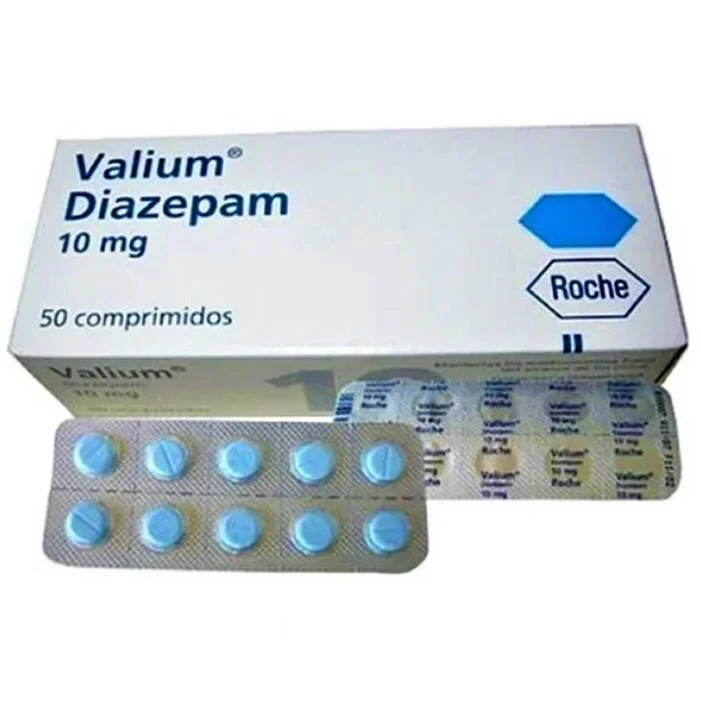Valium 10mg (Diazepam): Uses, Dosage, Side Effects, and Important Safety Information
Valium 10mg (Diazepam) is a medication prescribed to treat anxiety, muscle spasms, and certain types of seizures. It belongs to a class of drugs called benzodiazepines, which work by calming the brain and central nervous system. This makes it effective for short-term relief from various conditions, but its use should be carefully managed due to potential side effects and dependency risks.
What Is Valium (Diazepam)?
Valium is a brand name for the drug diazepam, which has been used for decades in the medical field. As a benzodiazepine, Valium helps to relax the body and mind by enhancing the effects of a neurotransmitter called gamma-aminobutyric acid (GABA). This results in a sedative effect that calms anxiety, reduces muscle tension, and controls seizures.
Uses of Valium 10mg
Valium 10mg is commonly used for:
-
Treating Anxiety: If you experience anxiety or stress, Valium can help calm your nerves and provide relief from feelings of unease. It’s often prescribed for short-term use to manage anxiety until longer-term treatments, such as therapy, can take effect.
-
Muscle Relaxation: Valium 10mg is effective in treating muscle spasms. Whether you’ve suffered an injury or have a condition that causes muscle tightness, Valium can help loosen up muscles and provide relief from discomfort.
-
Seizure Control: Valium is used to treat seizure disorders, such as epilepsy. It can help stop seizures or prevent them from occurring in some cases.
-
Managing Alcohol Withdrawal: When someone stops drinking alcohol suddenly after heavy use, withdrawal symptoms can be severe. Valium helps manage these symptoms by reducing anxiety, preventing seizures, and easing other withdrawal effects.
How Does Valium Work?
Valium works by increasing the effects of GABA, which is a neurotransmitter that inhibits brain activity. By boosting GABA’s activity, Valium slows down brain function, leading to a calming effect. This is why it is effective for anxiety and seizure disorders, where the brain may be overly active.
Valium 10mg Dosage Guidelines
For most people, the recommended dose of Valium 10mg is:
- Anxiety: 2 to 10 mg, taken 2 to 4 times a day.
- Muscle Spasms: A typical dose is 2 to 10 mg, taken 3 to 4 times a day.
- Seizures: The dose can vary significantly, and your doctor will decide the amount based on your condition.
Always follow your doctor’s instructions. Avoid adjusting your dosage or frequency without consulting them first.
Side Effects of Valium 10mg
While Valium can be very effective, it may cause side effects. Some common side effects include:
- Drowsiness
- Dizziness
- Muscle weakness
- Blurred vision
- Fatigue
In rare cases, more serious side effects may occur, such as:
- Memory problems
- Severe allergic reactions (difficulty breathing, swelling of the face or throat)
- Trouble walking or speaking
- Deep or irregular breathing
If you experience any serious side effects, contact your doctor immediately.
Important Warnings and Precautions
Before taking Valium, make sure your doctor is aware of any pre-existing health conditions. This includes:
- Liver or kidney problems: If your liver or kidneys aren’t working properly, your doctor may adjust your dose.
- Respiratory issues: Valium can affect breathing, so it’s important to tell your doctor if you have any lung problems.
- History of substance abuse: People with a history of addiction may be at higher risk for dependency on Valium.
Drug Interactions
Valium can interact with other medications, which may increase the risk of side effects. Common drugs that may interact with Valium include:
- Other sedatives or painkillers (especially opioids)
- Antidepressants
- Antihistamines
- Anticonvulsants
- Antifungal medications
Always check with your healthcare provider before combining Valium with any other drugs to ensure safety.
Risk of Dependency and Withdrawal
Valium has a potential for dependency, especially if taken for long periods or in high doses. Dependency can develop when the body becomes reliant on the drug to function normally. Stopping Valium suddenly can lead to withdrawal symptoms, including:
- Anxiety
- Sweating
- Tremors
- Insomnia
- Irritability
If you want to stop taking Valium, your doctor will help you gradually reduce the dose to avoid withdrawal symptoms.
Alcohol and Valium: A Dangerous Combination
Both alcohol and Valium are central nervous system depressants, meaning they slow down brain function. When combined, they can increase drowsiness and the risk of breathing problems, making this combination extremely dangerous. Never mix Valium with alcohol.
Valium and Pregnancy
Valium should generally be avoided during pregnancy, especially in the first trimester, as it may harm the developing baby. If you are pregnant or planning to become pregnant, talk to your doctor before taking Valium.
Driving and Operating Machinery
Since Valium can cause drowsiness, it can impair your ability to drive or operate machinery safely. If you are feeling sleepy or dizzy after taking Valium, avoid driving or using heavy equipment.
How to Take Valium 10mg
Valium comes in tablet form and should be taken exactly as prescribed. You can take it with or without food, depending on your preference. If you miss a dose, take it as soon as you remember unless it is nearly time for your next dose. Never take two doses at once.
Valium Overdose: What to Do
An overdose of Valium is a serious medical emergency. Symptoms of an overdose include extreme drowsiness, confusion, weak muscles, and slow or shallow breathing. If you suspect an overdose, get medical help immediately.
Is Valium Addictive?
Yes, Valium can be addictive, especially if it is used for long periods or in higher-than-recommended doses. It is important to use Valium only as prescribed to avoid dependency. Always talk to your doctor if you feel that you may be developing a dependency on the medication.
Conclusion
Valium 10mg (Diazepam) is an effective treatment for anxiety, muscle spasms, and seizures. However, it should be used with caution due to its potential side effects and risk of dependency. Always follow your doctor’s instructions and avoid combining Valium with other sedatives, alcohol, or certain medications. If you have any questions or concerns about using Valium, be sure to discuss them with your healthcare provider to ensure it is the right choice for you.








